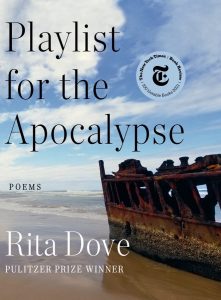Fulbright Chronicles, Volume 1, Number 3 (2022)
Author
K. Narayana Chandran

Playlist for the Apocalypse: Poems by Rita Dove, Fulbright Scholar to Germany in 1974 and a Fulbright Lifetime Achievement Medal Recipient in 2009.
The poems in Pulitzer-Prize winning poet Rita Dove’s eleventh collection appeal to us not by being “poetic” in the traditional sense of the word, as a romantic lyricist would use it. On the contrary, she suggests that all the language we use is poetry.
One example is “This Is the Poem I Did Not Write.” The raw materials for Dove are all quotidian. They are things and deeds we routinely forget once we are done. They hardly qualify as acts or conditions conducive to lyric composition:
Putting on rice, the laundry,
… [the] time for pills and injections,
… stairs up, stairs down.
One martini late in the day. Writing other poems―
less important, better behaved. (102)
There you have the poet in the poem, now trivializing gender-obsessions and literary conventions at once (in “Trans-”); now learning little lessons from the “spring cricket” in a series inspired by Charles Dickens’s novella, The Cricket on the Hearth; and now writing modern-day odes, such as “On a Shopping List Found in Last Season’s Shorts,” where even such small things as candy (“Ritter Sport, Almond Joy, / Mars bars and Neccos”) (79) become a fond revelation made fonder by a daughter’s abiding grief.
Anyone who has traveled to or from the United States will find Dove’s “A Standing Witness” more educative about the country than any academic project. This fine-tuned lyric cluster, written to oblige the composer Richard Danielpour, takes as its epigraph James Baldwin’s, “People are trapped in history and history is trapped in them.” The brief episodes that follow, involving American politicians and pundits on parade, bear this out.
These “testimonies,” framed by a “Prologue” and an “Epilogue,” read like the errata of our conscience, especially those on Roe v. Wade, Iran Vigil, the 1990’s, 9/11, Obama, and Trump―each one summoned from the recent past as knowledge or experience to consider. “The Twelfth Testimony” rhymes “Pomp” of its title with “Trump” and wonders: “O indolent friends, bitter patriots: / What have you triggered that can’t be undone?” (72)
Those who are wary around poetry will do well with this volume. Readers will feel cheered by Dove’s “Prose in a Small Space” where she asks them to think what confines and what flies when imagination rules. They’ll find any one of the poems in the section “Little Book of Woe”—all related to her personal experience with multiple sclerosis—to be reading them. “Blues, Straight,” and “Voiceover” and others that follow, sound almost like their own stray thoughts on a lonely walk: “There are spaces for living / and spaces for forgetting” (96).
Dove collects her lived experiences and vibrant thoughts of many worlds now become one.
Dove’s cryptic framing devices (epigraphs and glosses, sudden revisions of thought, and allusions to pop and folk motifs) are often helpful, but sometimes not so much. “Trayvon, Redux” overuses italicized asides—words we don’t quite hear—as essential to the narrative, and despite the help from her epigraph from William Carlos Williams, we feel left out.
We quite see the point, however, in the “fine basket of riddles” which she finally serves up along with her rhetorical questions:
If a mouth shoots off and no one’s around
to hear it, who can say which came first―
push or shove, bang or whimper?
Which is news fit to write home about? (43)
The real pleasure in reading the latest collection by this award-winning poet—she was the first African-American to be appointed US poet laureate and was the recipient of the Fulbright Lifetime Achievement Medal in 2009 (among many other awards)—is to relish her way of writing such splendid poems from home and abroad. Dove collects here her lived experiences and vibrant thoughts of many worlds now become one.
Rita Dove, Playlist for the Apocalypse: Poems. New York: WW Norton. 2021. 114 pp. $26.95.
Biography

A teacher of English for 40-odd years, K. Narayana Chandran currently holds the Institution of Eminence Research Chair in English and Cultural Theory in the School of Humanities at the University of Hyderabad, India. His publications include books/ monographs besides more than hundred and fifty papers/ chapters on Anglo-American literatures, English in India, and comparative studies in English. An occasional translator and writer in Malayalam, he has been offering courses in literary theory, English critical thought and pedagogy, and Anglo-American and New Literatures in English. Among his academic honors are a UGC Mid-Career Award and Senior Fulbright Fellowship at Stanford University, 1999.
